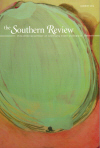The Southern Review – Summer 2013
The Southern Review is published by Louisiana State University and has a long-standing literary tradition dating back to 1935. It seeks to find work that pays careful attention to craftsmanship and technique and to the seriousness of the subject matter. The most recent issue is indeed a finely crafted publication that starts strong and remains so throughout. This issue is packed with fiction, nonfiction, poetry, and the art of Patricia Spergel.
The Southern Review is published by Louisiana State University and has a long-standing literary tradition dating back to 1935. It seeks to find work that pays careful attention to craftsmanship and technique and to the seriousness of the subject matter. The most recent issue is indeed a finely crafted publication that starts strong and remains so throughout. This issue is packed with fiction, nonfiction, poetry, and the art of Patricia Spergel.
Katherine Heiny’s “The Seamy Side” is tightly woven story that keeps the reader engaged with its unique characters, the occasional humorous moment, and overall beautifully written text. The story is told in the third person and revolves around a man named Graham, his wife Audra, his ex-wife Elspeth, and their inability to ever say what they really mean or do what they really want. Heiny uses dialogue in a very methodical manner to propel her story forward. In the first half of the story, anything Graham, Audra, or Elspeth say is followed by the narrator’s translation of what they really mean to say.
“Audra told me [your son] goes to the Gateway School,” Elspeth said. “I didn’t realize he was autistic.” I guess everything didn’t turn out so hunky-dory for you and Audra after all.
“He’s not autistic,” Graham said. “. . . Lots of kids there have exceptional IQ’s.” And, as anyone with a special-needs child could tell you, that sort of defensive speech was code for Watch it.
As the story progresses the narrator does this less and less, but the reader now knows the characters well enough that they can read into the dialogue themselves:
She slumped against her cart suddenly, forsaking her usual perfect posture. “Could we, like, not do this anymore?” she said. “Not pretend to be friends? I really don’t need you and Audra to show me how great your marriage is and prove to me that you were meant to be together.”
The withdrawal of these translations does a couple of things, it allows for a more genuine connection to the characters, and it creates a sort of void or sense of longing within the story. Heiny couples this with an actual sense of loss that all the characters are feeling at the end of the story as they realize that just like their words are not what they mean, their lives will never be exactly as they want them to be either.
“Corpse’s Lullaby” by Sasha West is a hauntingly beautiful poem that is immediately captivating. West used her title to work to her advantage by making the idea of death more explicit for her poem. The poem itself never mentions death, the reader can only assume from the title that is what the poem is about. The text of the poem works with its cascading form to truly create a lullaby, something comfortingly painful; there is a sense of loss that comes in the form of questioning:
How long would it take to wrap my lover’s body in red string?
How many skeins and how numb the bending fingers when done?
How long would it take to weave my hair between the hairs of his body?
The emotional pain in the poem seems to come from the fact that this “lullaby” is written for a corpse, for the idea of a person and not the actual person. It is also compelling that the corpse could be perceived as the writer or the subject of the poem. The last line of the poem begs the reader to read the poem again and again, “. . . He returns / to the nothing I made him and lies down there on the idea of my body.”
This was a hard issue to pick out only a couple of pieces of work to talk about because, truth be told, I wanted to write about all of them. If you pick up a copy of The Southern Review (and you should) it will not matter which page you turn to, you are guaranteed to be reading something worthwhile, engaging, and powerful.
[thesouthernreview.org]





